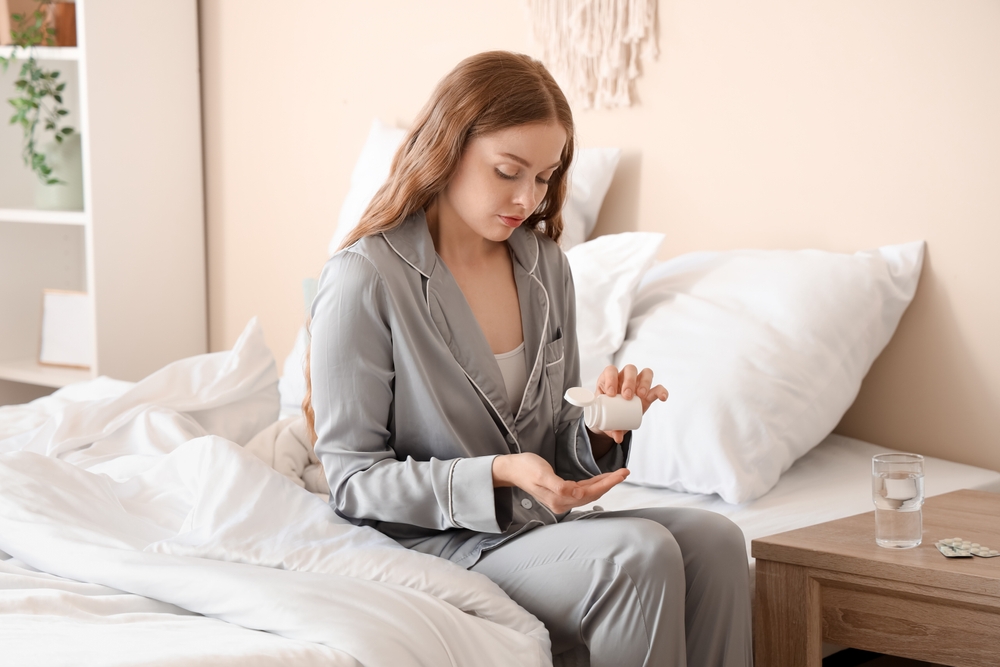Last Updated:
July 29th, 2025
Sleeping Pill Rehab Treatment | What to Expect
Sleeping pills are meant to be a short-term solution. For many, they start out that way. But what happens when sleep doesn’t come without them? What happens when a few nights turn into months and suddenly, stopping feels harder than continuing? This is where sleeping pill rehab steps in.
No matter what type of sleeping pill is causing the issue for you, support exists to help you rebuild a natural sleep rhythm and address the reasons the medication became necessary in the first place.
This page offers an overview of the rehab process and links to specific programmes depending on the medication you’re dealing with. It’s a good place to start if you’re unsure what help looks like or whether rehab is the right step.

Struggling with an addiction? If you are ready to seek help, reach out to us today, and a member of our compassionate team will help you find the best option for starting your recovery journey.
What types of sleeping pill rehab are available?
Sleeping pill rehab is not one-size-fits-all. Each drug has its own withdrawal profile, psychological effects and risks. That’s why sleeping pill rehab programmes are designed around the specific medication you’re dealing with.
Here’s a closer look at three of the most commonly treated sleeping pill dependencies:
Zoloft
Zopiclone
When should I consider sleeping pill rehab?
It’s easy to overlook sleeping pill dependency. Unlike street drugs or alcohol, these medications are often taken at night, behind closed doors and in isolation. But if your nights revolve around your next dose and your days are shaped by whether or not you slept, that’s a red flag.
You might want to consider rehab if:
- You’ve tried stopping and couldn’t sleep for days
- You’ve increased your dosage without consulting your doctor
- You feel anxious or panicked when your supply is running low
- You rely on the pill to feel calm, not just to fall asleep
- Your thoughts about sleep are obsessive, overwhelming or disruptive
Even if only one of these applies, it’s enough to explore your options. Dependency can creep in slowly. You don’t need to wait until it feels extreme to take it seriously.
What happens in sleeping pill rehab?
Rehab is a chance to step away from the cycle of dependency and build something better. It gives you the space, time and guidance to reset, both physically and mentally.
You’ll have personalised care to help manage symptoms like rebound insomnia, anxiety, mood swings and vivid dreams. If needed, you may be offered tapering plans or short-term medications to ease the transition.
You’ll explore the emotional, behavioural or psychological reasons that sleep became dependent on a pill. Was it anxiety? Grief? Work stress? A sense of needing to switch off and escape?
Therapy helps you process these factors while building new tools for emotional regulation and better sleep hygiene.
Sessions often include:
- One-to-one counselling: This therapy offers personal space to explore stressors, trauma or anxiety that contributed to pill dependency, helping you understand how the cycle of use first began.
- CBT (Cognitive Behavioural Therapy): CBT targets negative beliefs around sleep and dependency, helping you rebuild confidence in your ability to rest without needing medication.
- Group therapy: Group Therapy connects you with others facing similar struggles, reducing isolation and sharing coping strategies for sleep issues and withdrawal challenges.
- Holistic therapies such as breathwork, meditation and art: These types of holistic therapies help to rebuild the mind-body connection, easing anxiety and teaching your nervous system how to settle without relying on sleeping pills.
You’ll have access to support groups, relapse prevention tools and check-ins with your care team. The aim is to make sure your recovery stays stable, even after rehab ends. When you go back to your normal routine outside of rehab, it can throw up some difficult scenarios, some of which may not have been covered in rehab. Aftercare gives you a space to work out a solution for these situations.
Why quitting sleeping pills on your own can backfire
Sleeping pill withdrawal is more than just sleepless nights. It can involve a cascade of symptoms: agitation, tremors, panic attacks, disorientation and, in some cases, dangerous shifts in blood pressure or heart rate.
Trying to deal with this alone, especially when exhausted, increases your risk of relapse. When your body is desperate for rest, willpower alone rarely wins.
In rehab, you’re not expected to push through. You’re supported every step of the way, whether that be physically or emotionally. There’s a structure in place to catch you when you wobble, people who understand what you’re going through and space to get through the hard nights without reaching for another pill.

What sleeping pills don’t fix
People often come into rehab thinking they have a sleep problem, but what many discover is that the pill was helping them silence something.
Maybe it was anxiety that crept in as soon as the lights went off. Maybe it was racing thoughts, guilt, heartbreak or dread about the next day. Whatever the reason, the pill worked. Until it didn’t.
Sleeping pills rarely fix the root cause. They mask it. In rehab, part of the work is gently peeling back those layers to find out what was there all along and learning healthier ways to meet those needs.
You won’t be rushed. You won’t be judged. But you will be asked, at some point: what was the pill helping you avoid?
Take the next step
Sleeping pill rehab doesn’t mean you’ve failed. It means you’ve chosen to take care of yourself in a way that honours your health and your peace of mind. It’s a brave decision — and one you don’t have to make alone.
At Addiction Helper, we can talk you through your options, explain how the process works and connect you with the right treatment centre. Whether you’re ready to start or just thinking about it, the next step is always a conversation.
Get in touch when you’re ready. We’re here to help.
Our compassionate team are ready and available to take your call, and guide you towards lasting the lasting addiction recovery you deserve.

